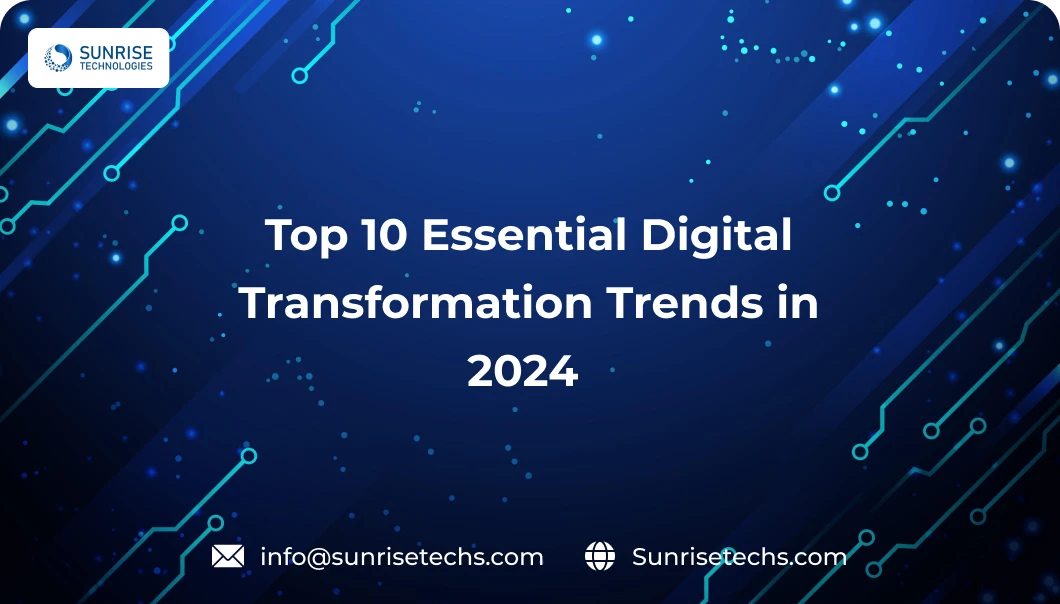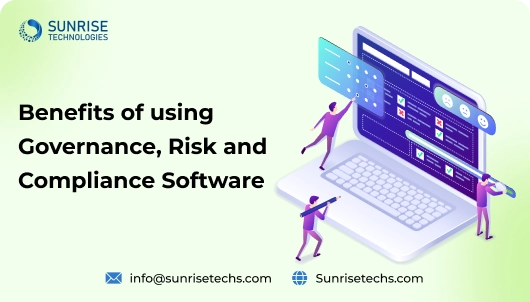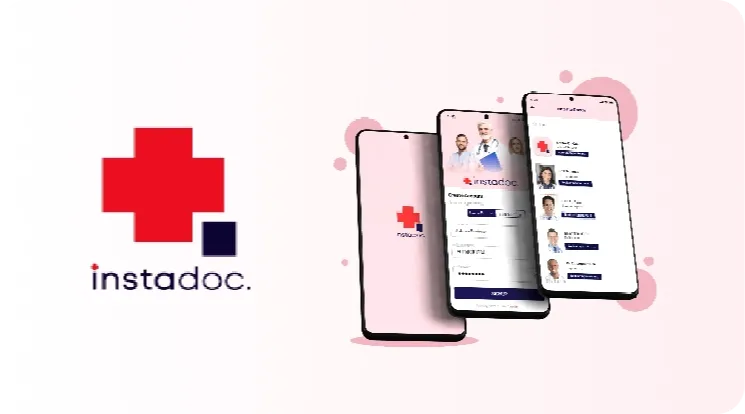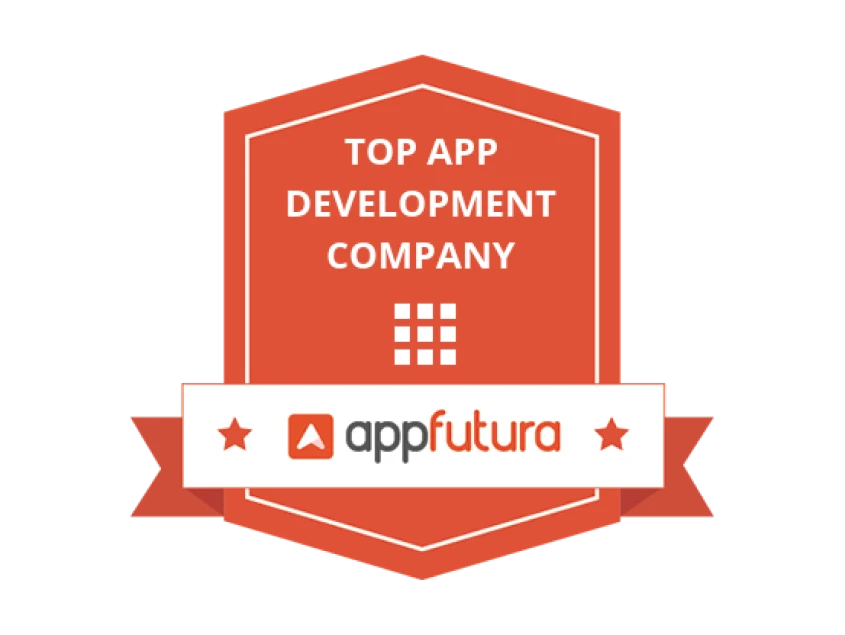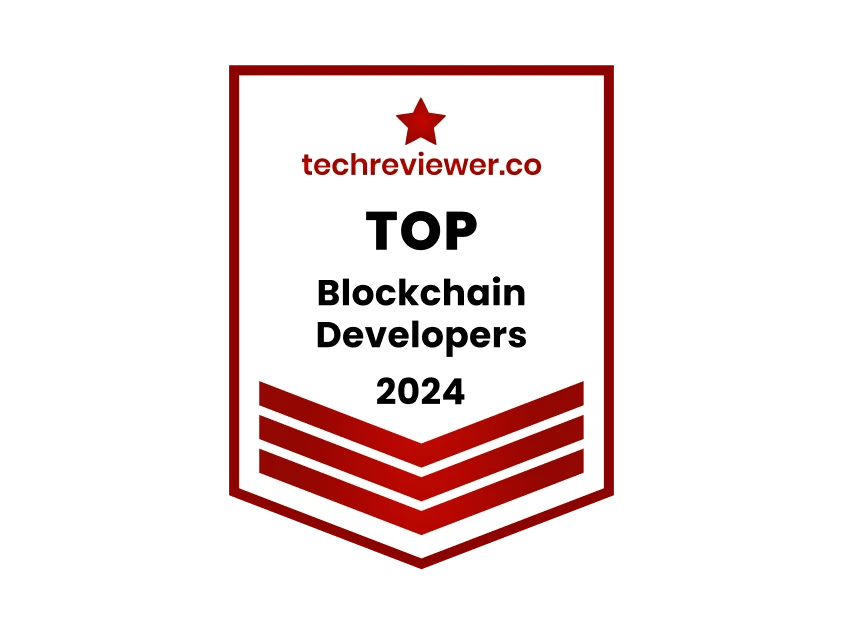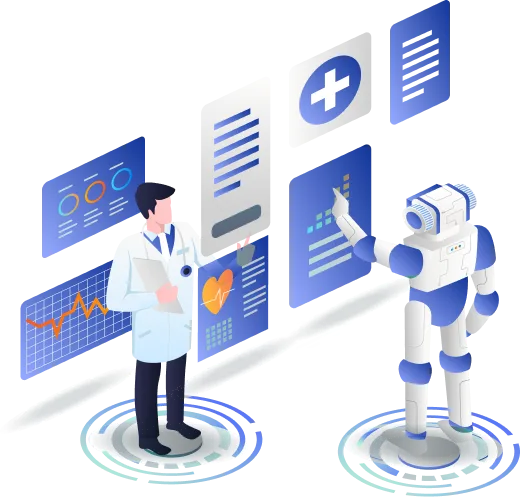
The Rise of AI in Healthcare: AI's Transformative Impact on the Healthcare Industry
April 08, 2024
AI has revolutionized patient care in recent years by integrating into healthcare systems. Machine learning, NLP, and computer vision are just a few of the ways in which AI is changing the way we deliver healthcare. AI in healthcare industry is also revolutionizing the way we diagnose, treat, and improve patient outcomes. The global market for healthcare AI is expected to grow at a CAGR (Compound Annual Growth Rate) of 37% between 2022 and 2030, reaching a total value of $188 billion. These staggering numbers demonstrate the growing awareness of AI amongst healthcare providers and stakeholders.
AI is a game-changer for healthcare providers and patients alike. It can revolutionize a wide range of operational areas, from improving patient care and chronic disease management to early risk identification, streamlining workflows, and streamlining processes. In this article, we’ll dive deep into the world of artificial intelligence (AI) in the healthcare industry. We’ll explore how AI is being used and how it’s going to shape the future of healthcare delivery.
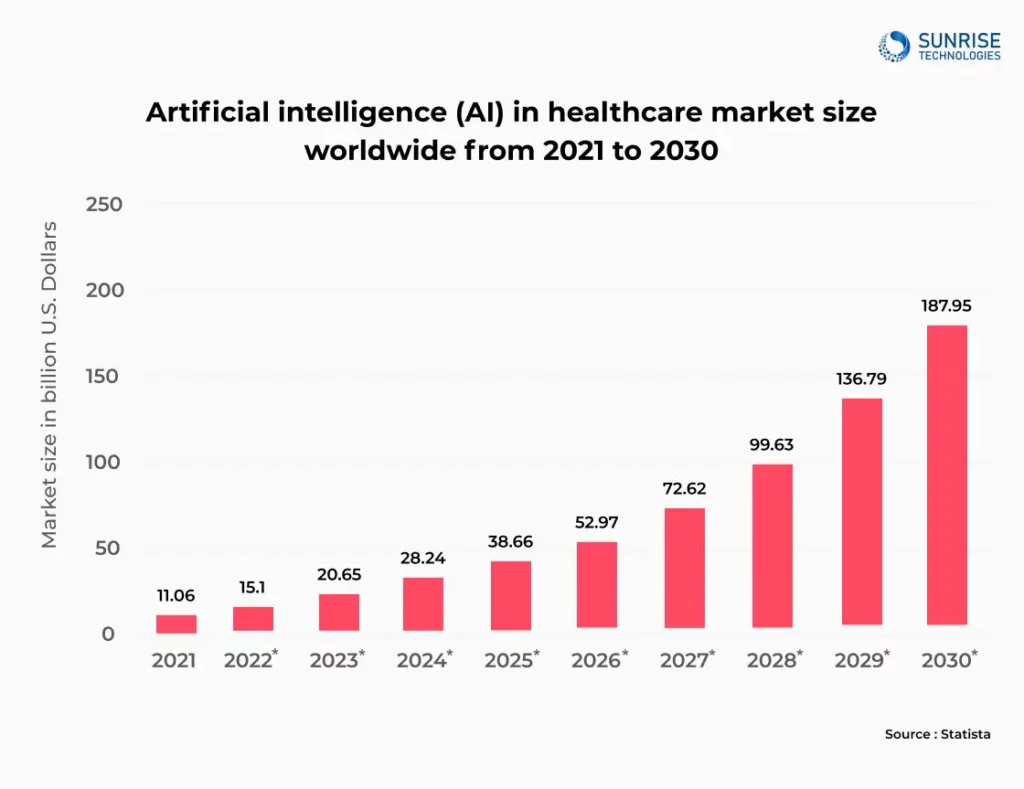
What is AI in Healthcare?
AI in healthcare refers to the application of advanced computational algorithms and technologies to analyze vast amounts of medical data with the aim of improving patient outcomes, optimizing clinical workflows, and enhancing overall healthcare delivery.
AI in healthcare includes a wide range of cutting-edge solutions, such as machine learning algorithms (ML), natural language processing (NLP), computer vision (CV) and predictive analytics (P&D). These AI-powered tools allow healthcare professionals to understand complex data structures, identify health risks and personalize treatment plans based on patient needs.
Real World Example – Apollo Hospitals
Apollo Hospitals has partnered with Google Cloud to leverage its technologies for delivering genomics-based AI-powered healthcare services. Here’s an explanation of how this collaboration might work.
Cancer Genomics:
Apollo Hospitals could analyze cancer patients’ genomic data using Google Cloud’s AI and machine learning capabilities to identify genetic mutations associated with specific types of cancer.
Inherited Genetic Disorders:
By leveraging Google Cloud’s genomics data management and AI tools, Apollo Hospitals could diagnose and manage inherited genetic disorders more effectively.
Pharmacogenomics:
Apollo Hospitals could use Google Cloud’s AI capabilities to analyze patients’ genomic data and predict their responses to various medications. This pharmacogenomics approach enables personalized medicine by guiding clinicians in selecting the most effective and safe drug therapies based on individual genetic variations, optimizing treatment outcomes and minimizing adverse reactions.
Rare Diseases Diagnosis:
Google Cloud’s machine learning models could assist Apollo Hospitals in diagnosing rare and undiagnosed genetic diseases by analyzing patients’ exome or genome sequencing data. By comparing the patient’s genetic variants to reference databases and clinical knowledge bases, AI algorithms can help identify potential disease-causing mutations and guide further diagnostic investigations or treatment decisions.
Population Health Management:
Apollo Hospitals could use Google Cloud’s analytics and AI tools to conduct population-level genomic analysis and identify individuals at increased risk for certain genetic conditions or predispositions.
Genomic Research Collaborations:
Apollo Hospitals could collaborate with research institutions and pharmaceutical companies using Google Cloud’s collaborative tools and data sharing capabilities.
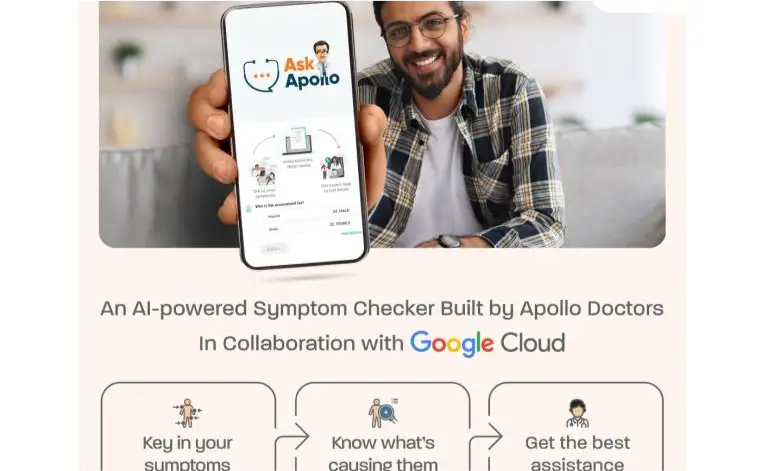
Top 12 Use Cases of AI in Healthcare

1. Analysis of Medical Imagery:
Algorithms enhanced by AI can scrutinize medical visuals like X-rays, MRIs, and CT scans. This aids radiologists in identifying irregularities, making accurate disease diagnoses, and directing treatment choices more effectively and efficiently.
2. Predictive Analytics:
AI algorithms analyze patient data to predict potential health outcomes, identify at-risk populations, and anticipate disease progression. This enables healthcare providers to intervene earlier, implement preventive measures, and tailor treatment plans to individual patient needs.
3. Personalized Medicine:
AI algorithms analyze genetic, clinical, and lifestyle data to personalize treatment plans and medication regimens for patients. By considering individual variations, AI helps optimize therapeutic outcomes and minimize adverse effects.
4. Virtual Health Assistants:
AI-powered virtual assistants provide patients with personalized health advice, medication reminders, appointment scheduling, and teleconsultation services. These virtual assistants enhance patient engagement, improve access to care, and support self-management of chronic conditions.
5. Drug Discovery and Development:
AI accelerates the drug discovery process by analyzing vast amounts of biomedical data, predicting drug-target interactions, and identifying potential candidates for drug repurposing. This leads to faster development of novel therapies and more efficient drug trials.
6. Clinical Decision Support Systems:
AI-based decision support systems provide healthcare providers with evidence-based recommendations, clinical guidelines, and diagnostic assistance at the point of care. This aids in reducing diagnostic errors, improving treatment adherence, and enhancing overall patient safety.
7. Remote Patient Monitoring:
AI-enabled wearable devices and IoT sensors monitor patients’ health parameters in real-time, enabling remote monitoring of vital signs, medication adherence, and disease progression. This facilitates early intervention, reduces hospital readmissions, and enhances patient autonomy.
8. Natural Language Processing (NLP):
NLP technologies extract valuable insights from unstructured clinical data such as medical notes, discharge summaries, and research articles. This enables healthcare organizations to unlock valuable insights, streamline documentation processes, and improve information retrieval.
9. Surgical Robotics:
AI-powered surgical robots assist surgeons in performing minimally invasive procedures with greater precision, control, and dexterity. This results in shorter recovery times, reduced complications, and improved surgical outcomes for patients.
10. Healthcare Fraud Detection:
AI algorithms analyze claims data, billing patterns, and historical records to detect fraudulent activities, billing errors, and improper payments within healthcare systems. This helps mitigate financial losses, ensure regulatory compliance, and maintain integrity in healthcare billing practices.
11. Enhancing Clinical Decision-Making with AI :
Artificial intelligence (AI) plays an essential role in support of clinical decision making by providing evidence-based insight, diagnostic support, and treatment advice to healthcare professionals. By analyzing large volumes of patient data (medical records, imaging data, genetic data, clinical guidelines, etc.).
AI algorithms can detect patterns, trends and correlations that human practitioners may not be able to see. By embedding AI-based decision support systems within clinical workflow, healthcare providers receive real time guidance and alerts that help interpret complex data and support best practice and protocol adherence.
12. Assisting in Repetitive Tasks:
AI technologies are increasingly employed to assist in repetitive tasks within healthcare settings, streamlining workflows, reducing manual labor, and optimizing operational efficiency. By leveraging AI-powered automation tools, healthcare organizations can alleviate the burden of routine administrative tasks such as data entry, scheduling appointments, and processing paperwork.
These systems can quickly and accurately handle large volumes of repetitive tasks, freeing up valuable time for healthcare professionals to focus on more complex and high-value activities, such as patient care and clinical decision-making.
AI in Healthcare – Types and Uses

In healthcare, various types of AI are employed to address different challenges and enhance various aspects of patient care, diagnosis, treatment, and administrative processes. The ai in healthcare trends some of the key types of AI used in healthcare include:
1. Machine Learning (ML):
Algorithms of machine learning scrutinize extensive datasets to detect patterns, tendencies, and associations, facilitating operations like medical image interpretation, patient hazard forecasting, and customized therapy suggestions.
2. Deep Learning:
Deep learning, a subset of machine learning, utilizes neural networks with multiple layers to automatically extract features from data. Deep learning is particularly effective in medical image analysis, natural language processing, and drug discovery.
3. Natural Language Processing (NLP):
NLP empowers computers to comprehend, decipher, and produce human language. In healthcare, NLP is used to extract information from medical records, automate clinical documentation, and assist in medical coding and billing.
4. Computer Vision:
Computer vision technology enables computers to interpret and analyze visual information from medical images such as X-rays, MRIs, and CT scans. Computer vision is used in tasks such as detecting abnormalities, assisting in surgical procedures, and improving radiology workflows.
5. Robotics:
Robotics technology is used in healthcare for tasks such as surgical robotics, rehabilitation robotics, telepresence robots for remote patient monitoring, and assistance in caregiving tasks.
6. Expert Systems:
Expert systems emulate the decision-making capabilities of human specialists in particular fields. In healthcare, expert systems are used for diagnosis support, treatment planning, and providing medical advice based on established rules and knowledge bases.
7. Predictive Analytics:
Predictive analytics utilizes past data to anticipate forthcoming events or results. In healthcare, predictive analytics is employed for patient management, resource allocation, predicting disease outbreaks, and identifying high-risk patients who may require proactive interventions.
8. Virtual Health Assistants:
Virtual health assistants are AI-powered systems designed to interact with patients, answer their questions, provide basic medical advice, schedule appointments, and assist in medication management.
These types of AI technologies are continually evolving and being adapted to address various challenges and opportunities in healthcare, with the goal of improving patient outcomes, reducing costs, and enhancing overall healthcare delivery.
Addressing Complexities of AI in Healthcare
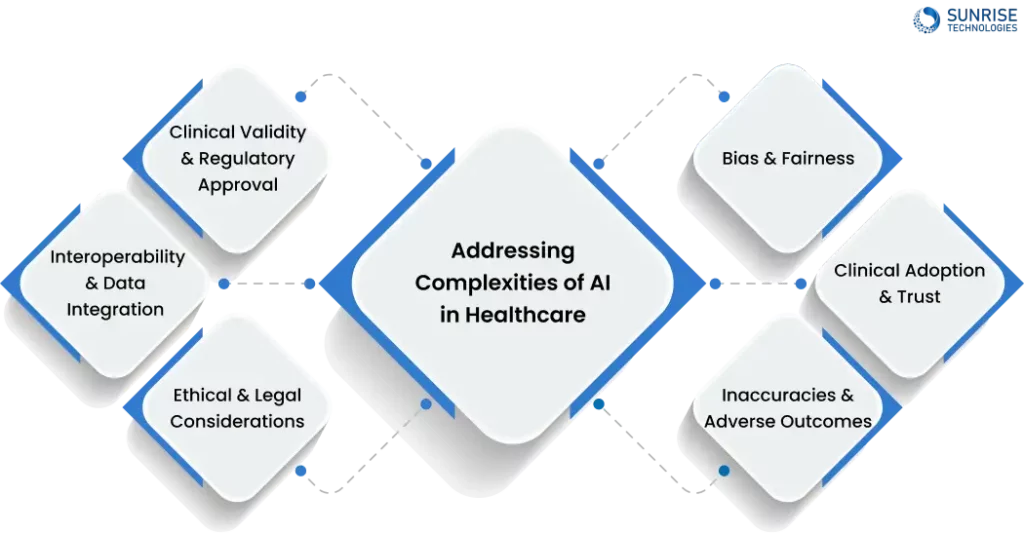
1. Clinical Validity and Regulatory Approval:
AI applications in healthcare need to undergo rigorous clinical validation to ensure their accuracy, reliability, and safety before receiving regulatory approval. Meeting regulatory standards, such as those set by the FDA (Food and Drug Administration) in the United States, adds complexity to the development and deployment of AI solutions in healthcare.
2. Interoperability and Data Integration:
Healthcare data is often siloed across different systems, including electronic health records (EHRs), imaging systems, and laboratory databases. Integrating and harmonizing this data to train AI models and generate actionable insights poses challenges due to variations in data formats, standards, and interoperability protocols.
3. Ethical and Legal Considerations:
AI in healthcare raises ethical concerns related to patient privacy, consent, and data security. Ensuring compliance with regulations such as HIPAA (Health Insurance Portability and Accountability Act) while leveraging AI to analyze sensitive patient data requires careful attention to ethical principles and legal requirements.
4. Bias and Fairness:
AI algorithms may inadvertently perpetuate biases present in healthcare data, leading to disparities in diagnosis, treatment, and patient outcomes. Addressing algorithmic bias and ensuring fairness in AI-driven decision-making is essential to mitigate these disparities and promote equitable healthcare delivery.
5. Clinical Adoption and Trust:
Healthcare professionals may be skeptical of AI technologies and may require education and training to understand their utility and limitations. Building trust in AI systems among healthcare providers and patients is crucial for successful adoption and integration into clinical practice.
6. Inaccuracies and Adverse Outcomes:
In some cases, AI systems can struggle to identify potential risks or determine appropriate treatment plans. For instance, an AI-powered system might suggest the wrong medication or misinterpret a radiology image, which could result in poor health outcomes or serious harm to the patient’s health.
How to Overcome these Challenges:
To overcome the challenges of AI applications in healthcare, a multi-stakeholder, multi-strategist approach is necessary. Here are some of the key steps to overcome these challenges:
1. Rigorous testing and validation:
Establish rigorous testing protocols to evaluate the accuracy, reliability and safety of the AI systems before deploying them in clinical settings. Routine validation studies should be conducted using diverse datasets and in real-world scenarios.
2. Continuous monitoring and improvement:
Establish mechanisms to continuously monitor and improve the quality of AI-generated insights to identify and address issues or inaccuracies. Improve the reliability and effectiveness of the AI systems over time by iteratively improving the quality of the data and user feedback.
3. Human oversight and collaboration:
Integration of AI systems should be seen as tools to complement human expertise rather than replacing it entirely. Healthcare professionals and AI developers should work together to combine clinical judgment and AI-generated insights so that decisions are based on both technical knowledge and clinical experience.
4. Selecting the Right AI Development Partner:
When selecting a company for AI development in healthcare, consider factors such as the company’s experience and expertise in healthcare-specific AI applications, including medical imaging analysis, clinical decision support, and predictive analytics. Look for a proven track record of successful AI projects in healthcare settings and partnerships with reputable healthcare organizations or research institutions.
Future of Artificial Intelligence in Healthcare
The healthcare industry is experiencing a profound transformation driven by the integration of AI, revolutionizing medical practices, patient care, and pharmaceutical operations. AI applications span a wide range of functionalities, from predicting optimal treatment strategies for complex conditions like breast cancer to anticipating emergency department demands with remarkable accuracy.
Looking forward, AI is set to redefine medical imaging with the advent of advanced radiology tools capable of providing intricate and precise images, potentially eliminating the need for invasive tissue sampling in select cases. Moreover, AI algorithms hold promise in assisting healthcare providers in evaluating cancer aggressiveness and tailoring treatments accordingly, heralding a new era of personalized medicine. Innovations in areas such as “digital pathology” and “quantitative imaging” are on the horizon, offering novel approaches to diagnosis and treatment planning.
Additionally, the fusion of electronic health data with AI analytics offers unprecedented opportunities for proactive healthcare management. AI-driven systems can identify patients at heightened risk of developing certain conditions and detect subtle infection patterns before symptoms manifest, enabling timely interventions to prevent disease progression. Furthermore, AI-powered predictive models can anticipate medical emergencies such as cardiac events or respiratory distress, allowing for preemptive measures to be taken to mitigate risks and improve patient outcomes.
We at Sunrise Technologies – AI development services company help healthcare industries with AI solutions that help to streamline administrative processes, such as medical coding, billing, and scheduling, enabling healthcare professionals to focus more on delivering quality care to patients. AI-powered clinical decision support systems provide physicians with real-time insights and recommendations to aid in diagnosis and treatment planning, leading to more accurate and timely interventions.
We have a well-experienced team of AI developers; we are ready to create innovative AI-driven solutions that are tailored to the specific requirements of the healthcare industry. By partnering with us, you will unlock the full power of AI in the healthcare industry and drive transformative change.
Sam is a chartered professional engineer with over 15 years of extensive experience in the software technology space. Over the years, Sam has held the position of Chief Technology Consultant for tech companies both in Australia and abroad before establishing his own software consulting firm in Sydney, Australia. In his current role, he manages a large team of developers and engineers across Australia and internationally, dedicated to delivering the best in software technology.


